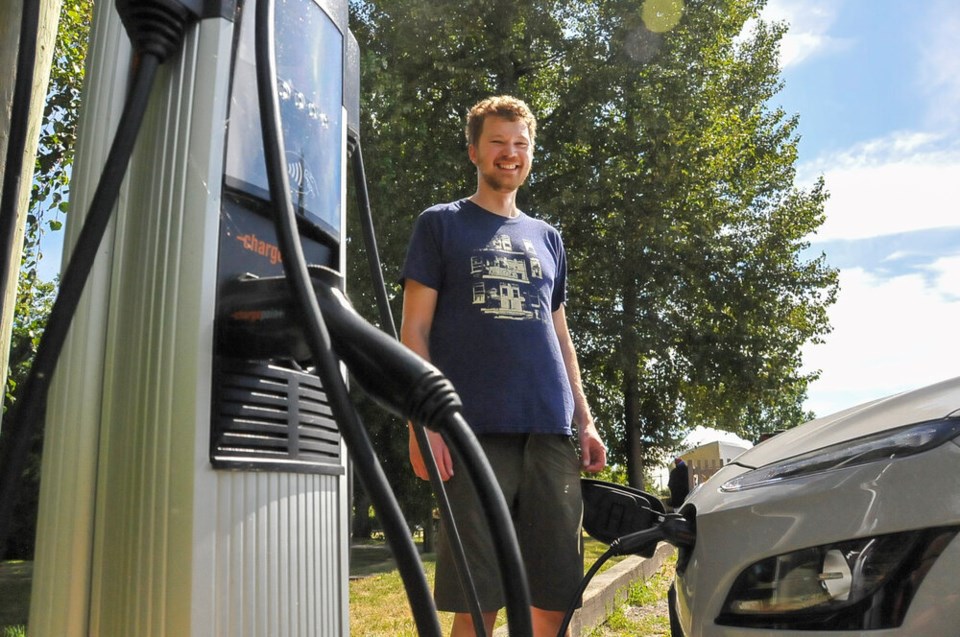The B.C. government said Tuesday it will invest $26 million to build another 250 new public charging stations across the province. Those charging stations will help complete the “Electric Highway,” a government program to install 10,000 public electric vehicle charging stations across B.C. highways by 2030.
The announcement comes amid the release of an annual report showing zero-emission vehicles continued to be sold at higher rates in B.C. than anywhere else in Canada. In 2022, 18.1 per cent of new passenger vehicle sales were electric or hybrid.
“Overall, excellent news for EV owners and people looking to buy an electric car,” said Mark Zacharias, a special advisor for Simon Fraser University’s Clean Energy Canada program, which works to accelerate Canada’s clean energy transition.
“That 18.1 per cent would likely have been much higher if EVs would have been more available.”
Zacharias said price wars between electric vehicle manufacturers like Tesla and Ford are increasingly bringing down the costs of vehicles. Meanwhile, advances in battery manufacturing, economies of scale and the relative simplicity of EV components means models like the Chevy Bolt and Hyundai Kona are almost equivalent in cost to their internal combustion engine siblings.
“We see cost parity between electric vehicles and internal combustion engines coming by 2025,” Zacharias said.
B.C. EV ownership surpasses 100,000 vehicles
Over the last six years, the number of registered electric light-duty vehicles climbed 20 fold to 100,000 from 5,000 in 2016.
And over that same period, the number of public charging stations has grown to more than 3,800 from 781, according to the latest Zero-Emission Vehicle Update, which sources market data from S&P Global Mobility.
Since the COVID-19 pandemic, transportation policymakers have faced significant hurdles as public transport ridership plummeted and the registration of new combustion engine vehicles skyrocketed. Last year, a Glacier Media investigation found of the quarter million vehicles added to British Columbia’s roads over the last six years, more than half hit the pavement in 2021 — a spike that has touched nearly every community in the province and threatens to undermine emission reduction targets.
At the same time, B.C. has a head start in its push to transition people from internal combustion vehicles to EVs or some other form of transportation. In 2019, B.C. was the first province to mandate new EV sales targets. Last year, the province shortened that timeline, requiring all new passenger vehicle sales to be zero-emissions by 2035 instead of 2040. The legislation is meant to ensure lower costs and greater availability of electric vehicles.
“We are well on our way to achieving the 2026 ZEV sales targets,” claimed the government in its report Tuesday.
The federal government has yet to catch up to B.C. In late 2022, federal Environment Minister Steven Guilbeault pledged to pass regulations that would require one-fifth of all passenger cars, SUVs and trucks sold in Canada by 2026 to be electric. By 2035, the plan would require every passenger vehicle sold in Canada to be electric.
Manufacturers or importers who don't meet the sales targets could face penalties under the Canadian Environmental Protection Act through a phased-in approach.
Number of EV rebates cut in half in 2022
Governments across Canada have used a number of rebate programs to encourage car buyers to purchase an electric vehicle. Between 2015 and 2022, two B.C. provincial governments have handed out nearly $200 million in rebates to buy zero-emission vehicles.
As costs have come down, the nature and scale of those rebate programs have changed.
The number of EV rebates handed out in 2022 totalled almost 9,700, roughly half that of the previous year. And since August 2022, rebates for electric vehicles have been made available for B.C. residents on a sliding income scale.
Anyone making under $80,000 a year can receive the full $4,000 rebate (up from a previous $3,000), while those making between $80,001 and $100,000 can access rebates of up to $2,000. Anyone with a higher income is not eligible for the provincial EV rebate. Combined with federal rebates, eligible British Columbians can now receive up to $9,000 to buy a new electric car.
The most popular vehicles bought with a rebate in 2022 where the Tesla Model 3, the Chevrolet Bolt, the Hyundai Kona, the Hyundai IONIQ 5, and the Mini Cooper BEV.





